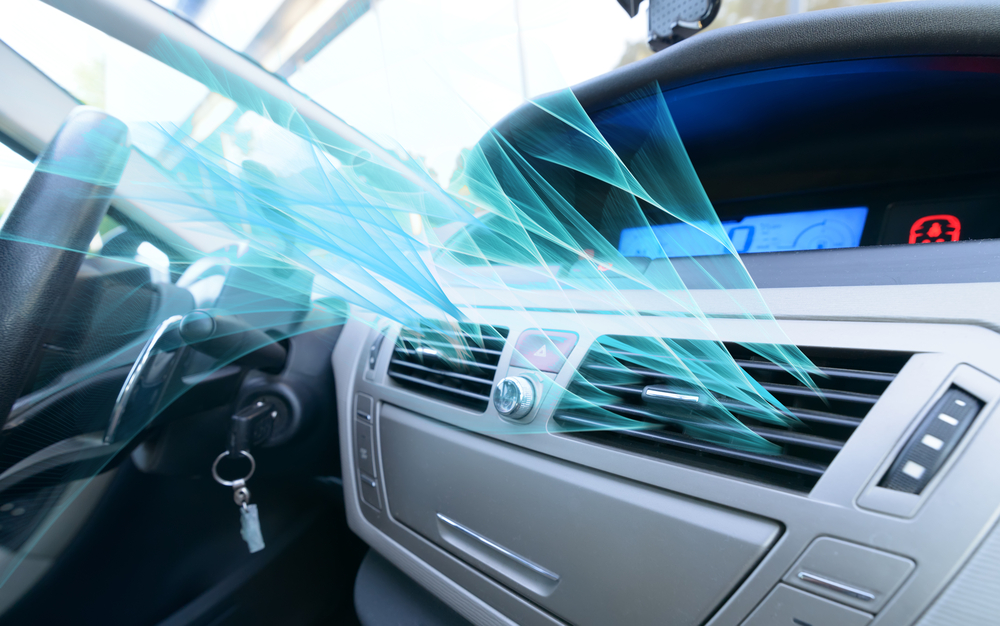In the scorching summer heat or the uncomfortable humidity of long road trips, air conditioning has become a staple feature in modern vehicles, providing much-needed comfort to drivers and passengers alike. It’s also crucial for keeping windows clear when the defrost or defog setting is on. However, a common question lingers: does air conditioning use gas and affect your fuel economy?
In this article, we’ll delve into this burning question, exploring the relationship between air conditioning usage and its potential effects on your vehicle’s fuel consumption.
HOW AIR CONDITIONING AFFECTS FUEL CONSUMPTION
To comprehend the impact of AC on gas mileage, it’s essential to first grasp how the A/C system functions. In simple terms, the AC system relies on a compressor to pressurize and circulate a refrigerant that absorbs heat from inside the vehicle and expels it outside. This process cools the cabin, making your drive more comfortable during hot weather. However, operating the A/C system does require energy, and that energy comes from your vehicle’s engine.
When you turn on the AC, the engine works harder to power the compressor and maintain the temperature inside the cabin. The increased workload results in higher fuel consumption, at least in theory. The engine’s fuel efficiency is influenced by various factors, including load and engine speed, and AC usage directly impacts these variables.
In general, the impact of AC on fuel consumption is more significant in city driving conditions compared to highway driving. In stop-and-go traffic, where the engine frequently revs up and down, the A/C system’s demand for power becomes noticeable. On the open highway, the impact is relatively less pronounced as the engine operates at a more consistent speed.
UNDERSTANDING GAS MILEAGE AND EFFICIENCY
To understand the AC’s effect on gas mileage, it’s crucial to grasp the concept of gas mileage and efficiency. Gas mileage, expressed as miles per gallon (MPG), indicates how many miles a vehicle can travel on a gallon of fuel. The higher the MPG, the more fuel-efficient the vehicle is.
Efficiency is a complex interplay of various factors, including the vehicle’s engine, weight, and driving conditions. AC usage is one of these factors, but it’s not the only one influencing gas mileage. Factors like tire pressure, vehicle maintenance, and driving habits also play significant roles in determining fuel efficiency. Overall, A/C might decrease your fuel mileage by up to 25%, and that becomes noticeable at the pump. You’ll want to figure out how to reduce the effect when possible.
TIPS FOR IMPROVING GAS MILEAGE WHILE USING A/C
Now that we’ve established that AC usage can affect fuel consumption let’s explore some practical tips to help you maintain a balance between comfort and fuel economy:
- Use A/C wisely. On the highway, consider using the A/C sparingly or turning it off when cruising at a constant speed. In stop-and-go traffic or during extreme heat, use the A/C strategically to stay comfortable without overtaxing your engine.
- Keep windows closed. When driving at high speeds on the highway, keeping your windows closed reduces aerodynamic drag, which can improve fuel efficiency.
- Park in the shade. Parking in the shade helps keep your car cooler, reducing the need for intense A/C use when you start your journey.
- Maintain your vehicle. Keep your vehicle well-maintained with routine oil and oil filter changes, air filter replacements, and tire rotations. A well-maintained engine runs more efficiently, which can offset some of the A/C-related fuel consumption.
- Maintain proper tire pressure. Ensure your tires are properly inflated. Underinflated tires can increase rolling resistance and decrease fuel efficiency.
SEASONAL CONSIDERATIONS: AC USAGE IN DIFFERENT WEATHER
AC usage may vary depending on the season. During hot summer months, it’s natural to rely more on AC to stay cool. However, during the fall and spring, you might have more flexibility to use natural ventilation and reduce AC usage.
In the winter, you might not think you’re using the AC at all, but you are. When the windshield is defrosting, the air conditioning cycles to remove moisture from your interior that causes the frost. Still, whenever possible, switch to another setting that doesn’t use AC to remove the drain on the system.
HYBRID AND ELECTRIC CARS: AC IMPACT ON RANGE
For hybrid and electric vehicle owners, AC usage can have a slightly different impact. EVs use the high-voltage battery to power the AC, which can lead to a reduction in the vehicle’s range. To mitigate this, some EVs offer features like preconditioning, allowing you to cool or heat the cabin while the vehicle is still connected to a charger.
Hybrid vehicles also see a decrease in fuel efficiency when running the AC, but the impact is typically less significant compared to traditional gasoline vehicles.
BALANCING COMFORT AND FUEL ECONOMY
So, does AC burn gas more than you expect? While it’s true that using the AC can impact gas mileage, the effect is manageable with mindful driving habits and vehicle maintenance. The key is to strike a balance between staying comfortable and maximizing fuel efficiency. By using the AC strategically, maintaining your vehicle, and considering seasonal variations, you can enjoy a comfortable ride without breaking the bank at the gas pump.
Remember that modern vehicles are designed to be more fuel-efficient than ever, and advancements in AC technology continue to improve energy efficiency. So, whether you’re cruising through the sweltering summer heat or embarking on a long road trip, rest assured that you can enjoy a cool, comfortable ride without sacrificing too much in terms of gas mileage.

